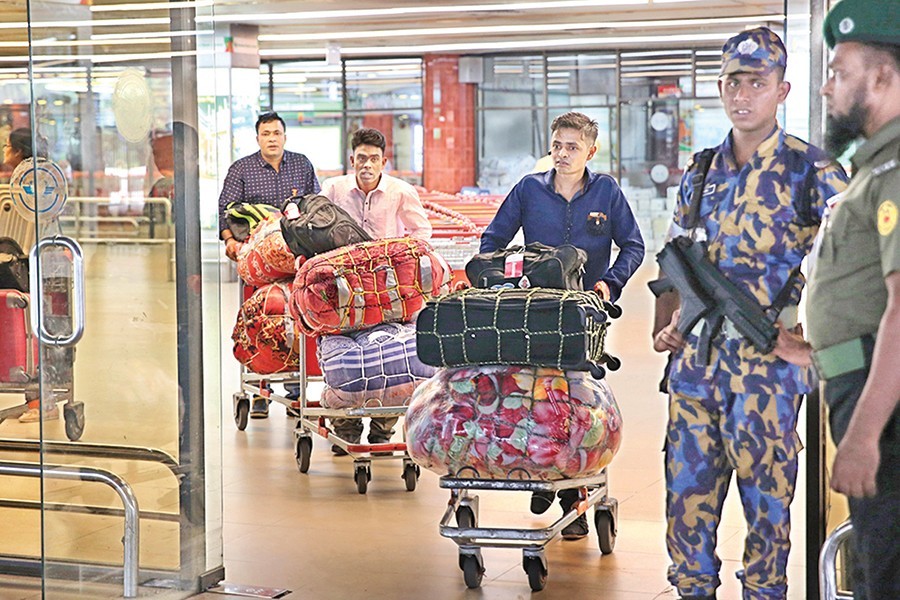Mass deportation of BD workers raises concern
Experts for prudent diplomatic, fiscal steps

Published :
Updated :

With 1,635 Bangladeshi workers deported from the Middle-East (M-E) countries last week and more in the pipeline, experts call for undertaking prudent diplomatic and fiscal management to absorb economic shock of the 'illegal' mass deportation.
Since April 27, some 1,635 Bangladeshi workers were deported from the region.
Besides, 755 more workers are scheduled to be deported from three countries by May 10, officials told the FE.
Among them, Oman will deport 289 Bangladeshi workers on May 7, and the Maldives will deport another 400 workers. On May 10, Bahrain is scheduled to deport another 66 workers.
Bangladesh got a list of around 18,000 workers, who will be deported within a couple of months, senior officials of the expatriates welfare and foreign ministries said.
Talking to the FE, experts said if immediate measures are not taken, the country will face a huge economic burden in the long run, as it largely depends on remittance to maintain a stable balance of payment situation.
"The government should heighten diplomatic efforts to contain pressure of the mass deportation, as it will affect our remittance," former finance adviser to the caretaker government Dr A B Mirza Azizul Islam told the FE.
Dr Ahsan H Mansoor, executive director of the Policy Research Institute (PRI), said the large-scale deportation of local workers will definitely create a negative impact on the country's remittance earning.
Remittance earning fell by 33 per cent in April, and it will further decrease in the coming months.
The mass deportation will also increase poverty in the country, and the rural economy will be affected with a dip in demand. The foreign wage earners' money is mainly remitted to rural Bangladesh, he explained.
The government has to find out areas, where the remittance loss can be cushioned.
"One area can be proper use of the money that we are now saving following low oil prices (in international market)," he added.
Professor Tasneem Siddiqui, Chair of the Dhaka University Refugee and Migratory Movements Research Unit (RMMRU), opined that the government should keep trying to stop the mass deportation process.
As per international law, mass deportation during a crisis period is illegal. The law clearly dictates that the host country should bear burden of the migrants during a global crisis, she noted.
"But we see that the countries in the Middle-East are deporting our workers on wholesale basis, which is unfair and unjust."
She noted that Bangladesh is trying a lot regarding this issue in bilateral front, but it should be raised more vigorously in multilateral forum.
Commenting on the issue, Foreign Minister Dr A K Abdul Momen told the FE that the government is carrying on frantic diplomatic efforts to minimise the trouble.
"The M-E countries are deporting workers of other countries also. We have requested them to slow down the process, so that it can be done in a staggered manner, and they have agreed to do it," he added.
Meanwhile, among the 1,635 recently deported workers, around 300 are kept in quarantine. The rest were sent home, as they were already in quarantine in the M-E states before deportation, an official of the foreign ministry said.
The government has so far arranged quarantine facility for some 2,300 people in Dhaka. There is a plan to expand the facility to nine divisional cities, where around 20,000 people can be quarantined, he added.
mirmostafiz@yahoo.com


 For all latest news, follow The Financial Express Google News channel.
For all latest news, follow The Financial Express Google News channel.